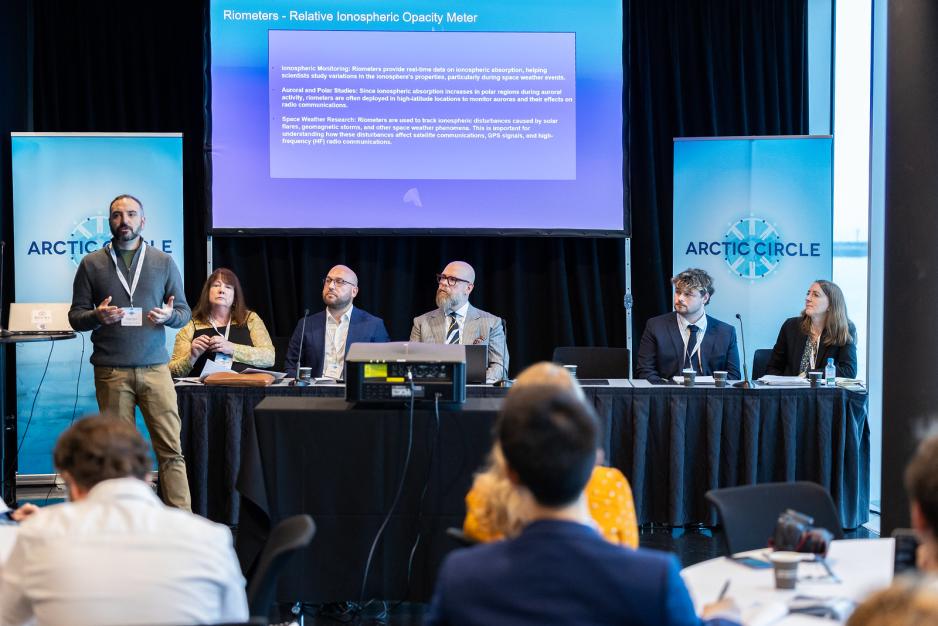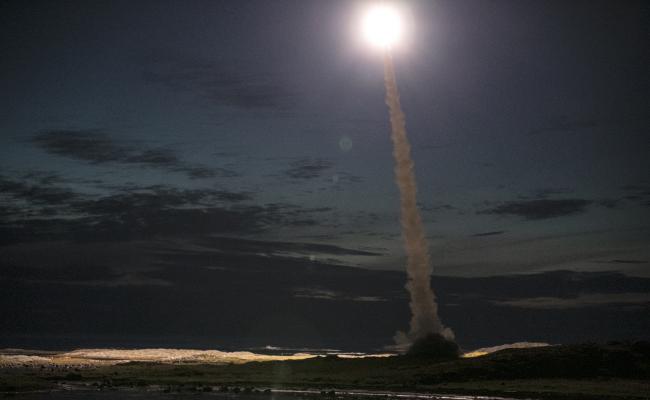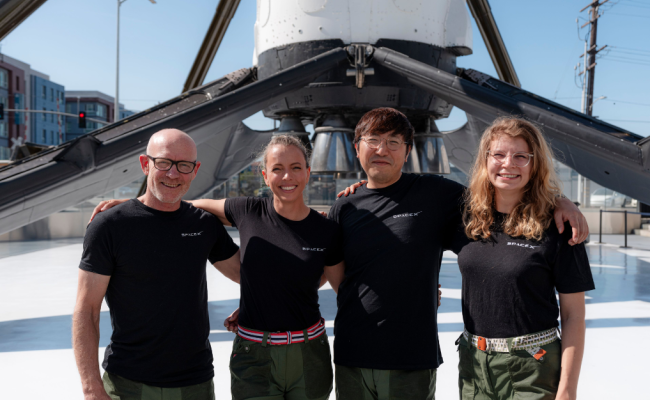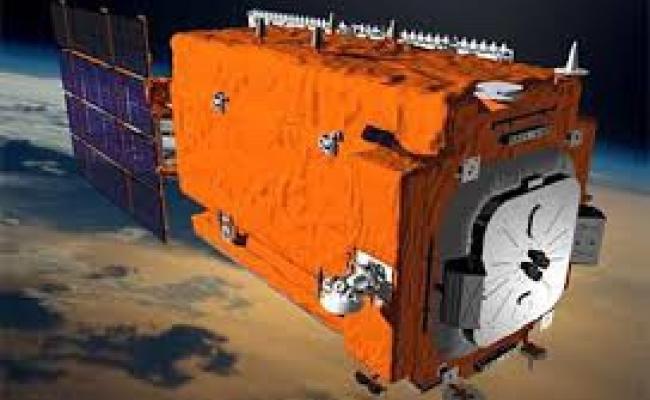The Arctic Circle Assembly 2024: "The Entire Northern Hemisphere Can Be Controlled From the Space Above the Arctic"

The "Science and (In)security: Dual-Use Technologies in an Opening Arctic" panel from the left: Gregory Falco, Caroline-Kennedy Pipe, Karl Attard, Jean-François Bélanger, Harry Macnamara, and Stephanie Pezard. The moderator was James Patton Rogers (not pictured). (Photo: the Arctic Circle Assembly)
Reykjavik, Iceland (High North News): Technology and science must adapt to the geopolitical shifts in the far north, and space is becoming an increasingly significant arena. "The entire Northern Hemisphere can be controlled from the space above the Arctic," says Tim Reilly from the University of Cambridge, emphasizing that the race between the US and China revolves around technology ownership.
On the third and last day of the Arctic Circle Assembly, 2024, in Reykjavik, Iceland, technology and the Arctic were on the agenda.
A session titled "Adapting Arctic Research: Responding to Geopolitical and Tech Shifts" brought together a panel of experts to discuss how cutting-edge technologies like satellite imaging and artificial intelligence are reshaping Arctic research in the face of geopolitical challenges.
Researcher Tim Reilly from the Scott Polar Research Institute at the University of Cambridge at the Arctic Circle Assembly 2024. (Photo: Birgitte Martinussen)
Institute Associate Dr. Tim Reilly from the Scott Polar Research Institute at the University of Cambridge argued that the governance of the Arctic will be influenced from space in the future.
"There is an assumption that governance in the 21st century over the Arctic is terrestrial-based – NATO, the Arctic Council, and those sorts of organizations. My view is that the existential risk in the Arctic is going to be increasing governance from space, and the key enabler of that will be AI," he stated during the session.
In a comment to High North News, Reilly emphasized, "If one can position oneself in space above the Arctic, one can influence two Oceans and three continents – the entire Northern Hemisphere."
He believes this partly explains why Russia, the US, and China are intensifying their presence in the Arctic region from space.
"With the advent of social media, Internet of Things, Big Data, AI, Machine Learning, Robotics, etc, the ability to influence governance, for instance, over the younger, techno-dominated generation in particular, in and over the Arctic from largely unregulated space via Polar-orbiting satellites is a temptation for all nations," he adds.
He says this may in time apply to similar types of governance across the entire Northern Hemisphere.
Recent events in Brazil illustrate Reilly's concerns, with Elon Musk and X having a significant impact on the country's political climate.
China and data
Reilly also illuminated the importance of climate research/monitoring from space in the Arctic and which actors are gathering crucial data.
China's research ambitions in the Arctic, including the Svalbard Yellow River Station and the China-Iceland Arctic Science Observatory, provide the country with access from space over the region for scientific reasons, such as climate monitoring.
The US' Arctic strategy of 2022 stated that, over the last decade, China had "expanded its scientific activities; and used these scientific engagements to conduct dual-use research with intelligence or military applications in the Arctic."
China will impact the governance of the Arctic.
"China has successfully positioned much of its technological data collection facilities in remote and offshore locations around the Arctic – science vessels, Unmanned Aerial Vehicles, drones, down/uplink stations, radar installations, and so on. All have up links to space-based satellite systems in various orbits – Low Earth, geosynchronous, and Polar orbits, etc," Reilly explains to High North News.
He says that China is gathering some of the best Arctic climate Big Data, a term that describes large and diverse datasets that are huge in volume and also grow rapidly in size over time and that are too large or complex to be handled by traditional data-processing application software.
"This well-organized, richly funded, and highly coordinated space-coordinated system ensures that China's, for example, climate/weather data collection system, including space-based remote sensing applications, is now second-to-none in the entire Arctic regions and being AI-based and capturing Big Data on climate, also means that its analysis of weather/climate in the region is also becoming world-class as well," he adds.
Also read (article continues below)
China in the Arctic Council

Researcher Tim Reilly from the Scott Polar Research Institute at the University of Cambridge at the Arctic Circle Assembly 2024. (Photo: Private)
Because of China's significant role in monitoring and data gathering, Reilly believes that people who advocate for keeping China out of the region and limiting its influence over the Arctic Council are behind the curve.
China's space/technology-generated scientific knowledge will be needed by the AC and climate organizations, such as the Intergovernmental Panel on Climate Change (IPCC), for their critical climate modeling.
"Within such a scenario, China's voice, via its science and scientific diplomacy, will inevitably impact, in one way or another, the governance of the Arctic—at the very least—and, more broadly, the Northern Hemisphere—in time, as well," he asserts.
China is providing the big data in the Arctic.
The panel discussing how to adapt Arctic research to geopolitical and technological shifts (from the left): Monika Szkarlat (MCSU), Tim Reilly (University of Cambridge), Kamil Filipek (Centre for Artificial Intelligence and Computational Modeling), Rasmus Gjedssø Bertelsen (The Arctic University of Norway), and Richard Ashley Morris (SIOS).
Reflection of the international order
Rasmus Gjedssø Bertelsen, Professor of Northern Studies at UiT - the Arctic University of Norway, wonders what the disjuncture in the Arctic could entail for science:
“The Arctic is divided. We have a Russian and a Western Arctic. The Arctic reflects the general division of the world. The Arctic reflects the international order," he says and adds:
"What does this division mean for these models and data? I am increasingly seeing parallel worlds, and I am also wondering to what extent we are seeing parallel worlds in terms of data and models."

Rasmus Gjedssø Bertelsen, Professor in High North studies at UiT - The Arctic University of Norway. Here he is pictured at a conference on Arctic security in Stavanger in 2018. (Photo: MSC/Kuhlmann).
Dual-use technologies
In a later session at the Arctic Circle Assembly titled "Science and (In)security: Dual-Use Technologies in an Opening Arctic", Karl Attard from the University of Southern Denmark explained the liability of dual-use technologies.
Dual-use items refer to goods, software and technology that can be used for both civilian and military applications.
In the context of the Arctic Circle Assembly, the panel expressly referred to satellites, AI, and Unmanned Aerial Vehicles, among others.
"We must be mindful of the risks and valid concerns surrounding dual-use technologies, as well as the potential for data misuse. We have seen time and time again how scientific advancements can be diverted and repurposed."
He says this concern is increasingly relevant as the lines between scientific, civilian, and military technologies blur.
Dr. Gregory Falco is an Assistant Professor at the Sibley School of Mechanical and Aerospace Engineering and the Systems Engineering Program at Cornell University. During the Arctic Circle Assembly, he explained how space is a warfighting domain. (Photo: Birgitte Martinussen)
Space is a warfighting domain
In the later session, Dr. Gregory Falco from Cornell University also stressed that space is a warfighting domain. He mainly works on developing aerospace capabilities, mostly for the US defense intelligence community.
He informs us that the number of satellites entering and eavesdropping on satellites in orbit is increasing.
"If we are seeing activity in space as a warfighting domain, why aren't we seeing this activity in space monitoring as a war-fighting domain as well?"
"And where do we do most of our space monitoring? In the High North and the Arctic."
The Arctic reflects the international order.
The research institute AI Now says, "AI is now firmly positioned as a critical strategic technology for the geopolitical and economic ambitions of nation-states" and that "governments are using industrial policy as a tool to increase their own geopolitical leverage and economic competitiveness – even as they cloak those objectives underneath thinly defined “AI for social good” aims."
Tim Reilly declares that states, specifically China and the US, are racing to own crucial technology - and this race closely connects space and the Arctic.
"The race for data is on. Why? Because the leading provider of global GDP in the 21st century will be the services sector, which is reliant on technology undergirding it. Where is that tech enabled? Space. Where is one of the best locations from which to operate it? The Arctic."
Small states, great power
Reilly concludes that the idea of power is changing and that smaller states can have inordinate power based on their technological capabilities.
"What is power today? Technology is part of it. It does not just belong to China and the US, it belongs to technology entrepreneur states like Taiwan, South Korea, and Estonia, as well," he says, pointing to the Arctic as a weather vane of this broader new power shift in the global order.
"Technology is not just in the hands of superpowers."







